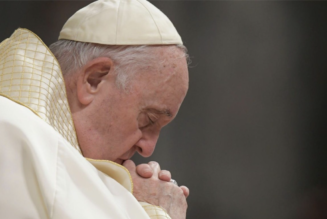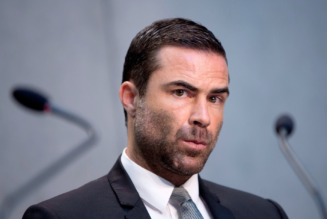
The lights were out. I was nestled in one of the many sleeping bags scattered on the floor of the prayer hall. Some of the men from our mosque in Raleigh were hosting a sleepover for us Muslim boys. It was a Friday during Ramadan so in a few hours they’d be waking us up for breakfast (which, of course, wouldn’t have any bacon), followed by Fajr (dawn) prayers.
Our instructors began walking up and down between the sleeping bags. They held flashlights and I watched the bulbs move about like bumblebees flying from one flower to the next. They wanted to make sure none of us boys were lying down on our stomachs. Some hadith had recorded it that Muhammad always slept on his back, so we were obviously supposed to do likewise. I wondered, even at thirteen, how on earth a detail like that had any bearing over good and evil.
As a Muslim I was taught to view sin as a “what” that a person did — that people became a sinner by sinning. The list of “whats” a person “should” and “shouldn’t” be doing can get incredibly extensive for the serious Muslim. A Muslim “should” break his or her Ramadan fasts by eating dates, since Muhammad did the same. A Muslim “shouldn’t” shake hands (bear in mind I was Muslim in pre-COVID times) with someone of the opposite sex, and “shouldn’t” yawn without covering his mouth (otherwise jinn could jump into their mouth!), according to some of my Sunday school teachers.
Providing adherents an extensive list of “whats” isn’t solely the domain of theistic religions. Ideologies, which often substitutes theistic religion, do so as well. The culture of political correctness, through the excesses of cancel culture and theories such as microaggressions, demonstrates that the lists of “whats” can become just as arbitrary as those of any religion, seeking to find prejudice and discrimination in every corner and under the cushions of every couch, determining whether a person is “good” or “deplorable” according to adherence to that list. The religious instinct still very much thrives even in the absence of formal religion.
There’s no shortage of Muslims, those more casual or nominal in their practice, who find tremendous humor in just how detailed the list of “rights” and “wrongs” in Islam can get. My own experience has taught me that it’s not difficult at all to meet a casual or nominal Muslim who drinks alcohol. But it’s very rare to find any Muslim who will violate one particular “what.”
The consumption of pork, like wine, is expressly forbidden in the Quran. I was 7 years old, at a friend’s birthday party, when I first became conscious that my religion made me a little different from most of my peers. The other kids were eating pepperoni pizza and I knew that I wasn’t allowed to. This was the beginning of a strange relationship, akin to a story which began with resentment and ended in romance.
Abstaining from pork is a simple enough task for an American Muslim. All one needs to do is say “…but with no bacon” while ordering at a restaurant, or occasionally pick at side items at catered events. The temptation to eat bacon was never felt while I was in college, since it wouldn’t get me drunk with my pals.
While I was growing up the majority of my friends were (casual or nominal) Christians who did eat bacon, and some of them were kind enough to pass me the reports that it tasted delicious. It didn’t escape my notice that these friends were (well, mostly) decent folks. I never had to resort to saying “Brian eats bacon, so I’ll have to keep an eye on my wallet.” And as far as I could tell Sam never said “it turns out there is a God… and it’s me!” upon finishing his breakfast. If Allah was going to interrogate all of us on the Day of Judgment (an event which every Muslim is taught to dread), it seemed rather far-fetched that eating bacon would be a chief reason why any of my friends would be sent to hell.
If the consumption of pork didn’t turn people into heretics and blasphemers, or do damage to the social fabric (which even gossip, something often viewed as very trivial, does), then why was it forbidden? If health reasons were going to be cited then why wasn’t something as unhealthy as consanguinity (my best friend in Sunday school, whose parents were cousins, died when he was 11 years old after a very rare allergic reaction to a medicine) forbidden? The only answer I really knew of was that pork was forbidden because it was forbidden, and that a servant owes his obedience to Allah.
And so I refrained from eating what was forbidden because it was forbidden throughout childhood, throughout college, and throughout my first years of living in New York. Even if I would go out to a bar with my pals, and drank like a fish with them, I could wake up the next morning hungover from our shenanigans and assure myself: “Well, at least I didn’t eat bacon.”
I did, of course, compile a list of “whats” over the course of years of acts that I’d committed and probably shouldn’t have. Yes, I’d shaken hands with many women. But some of the items on that list could also reasonably be counted as actual sins. As far as I could tell, my own list of “whats” wasn’t as extensive as the lists that many of my friends had compiled, and that was enough for me to count myself as a “decent” person. As a Muslim I even had a rock-solid plan: that sometime in my middle ages (when all those “whats” which I could chalk up to “youthful indiscretions” were done with) I’d go to Mecca and perform the Hajj so that the record of my sinful acts would get expunged. Being a “good” person seemed like a pretty easy task!
“I was telling Dan yesterday ‘I feel so sorry for Zubair because he’s never had bacon,’” my friend Kona, who was a new transplant to New York like myself, once told me, “and then I thought about it for a second and realized ‘hey wait, I’m vegetarian! I don’t eat bacon either!’” She told me this just a few months prior to events which would cause me to seriously reconsider my relationship with bacon.
I had left Islam in February 2006 while still having a belief in God, a belief in acting decently (according to whatever my own definition of “decency” was), and no interest whatsoever in being handed a list of “whats” from any religion. A list of “whats” was only as useful, or useless, as that list’s ability to encourage decent behavior, as far as I was concerned, and I knew all too well that many “whats” could be very arbitrary. But I lived in Manhattan, and didn’t own a car, so I never bought one of those “Coexist” bumper stickers.
Still, out of habit, I continued to tell myself that turkey bacon must surely be as good as the real thing.
Depression can do much to guide a person to unexpected places. A year after having left Islam, I was reading the Gospels (New Living Translation) for the first time. The Gospels do, of course, leave many impressions upon a former Muslim. It delighted me, for personal reasons, that Christ’s most scorning words were often reserved for the proud men who so carefully observed an extensive list of “whats.” It made tremendous sense that any valid list of “whats” really derived from just the two great commandments. It intrigued me that Christ, a religious Jew Himself, had such a casual attitude toward many of those “whats” which the Pharisees carefully observed.
The words of Christ demonstrated far more concern with the “why” which guides our “whats.” What are my destructive behaviors? is a question which every religion asks. Why am I so prone to those destructive behaviors in the first place? is the more sobering question addressed by the teachings of Christ. Am I sinner because I sin, or do I sin because I’m a sinner?
Adhering to rules, all while having very poor self-awareness, won’t make a person holy. Even if the promise of having that record of all of my sins erased during Hajj was true indeed, that darkness which loved committing those expunged sins so much would remain in my heart upon my return from Mecca. No amount of legislation, using force of law to compel “good” behaviors, can overcome that which God alone has the power to overcome. Proper diagnosis sets Christianity apart from other religions.
And the consumption of bacon, an act seen as evil throughout much of the world, really has nothing to do with the good and evil running through our hearts, as Christ himself had declared in the Gospel of Mark: “Food doesn’t go into your heart, but only passes through the stomach and then goes into the sewer.”
By the time of my baptism in June 2007 it wasn’t a matter of “if,” but only “when” I would take the plunge.
The deli around the corner from where I lived conveniently sold BLT sandwiches. I finally bought one in 2008. I took it to my apartment and let that scent of weekend mornings fill my nostrils. I bit into it and heard that special crunch as I did. “Hey that is pretty good,” I thought to myself while savoring the salty flavor. The thrill of being a damn rebel ran up my spine (I still feel this same thrill every time I eat bacon), and I could imagine my old Sunday school teachers standing there beside me, looking on in horror, asking: “Do you have no regard for God?”
“What is forbidden to the servants is allowed to the children,” I could tell them.
I’ve learned in the years since that bacon has many uses: it can be eaten by itself, it can go on a burger, it can be a pizza topping, it can be mixed with pasta, it can be sprinkled on salad, it can wrap the Thanksgiving turkey, it can be covered in chocolate, and it can even garnish a drink.
It is, historically speaking, uncommon for Muslims to convert to Christianity. A teaching such as the Holy Trinity (which I once figured to be theologically bad math) makes little-to-no sense to a person accustomed to the much simpler (I would have said “more coherent” back in the day) teaching of Allah. The Trinity is, in fact, a far more complete vision of God than rigid monotheism is, but my willingness to learn came in steps. Perhaps future Christian apologists, those hoping to plant the seeds of conversion in the minds of Muslims, will discover that while it is often futile to begin by trying to explain theological differences, seeds can indeed be planted by appealing to much simpler curiosities. The seeds of illumination wouldn’t so much be found in the works of St. Thomas Aquinas as in the simpler question: “What’s wrong with bacon?”
Join Our Telegram Group : Salvation & Prosperity









